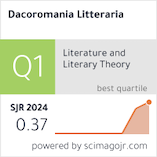THE CULTURAL TURNS: FROM CONVERGENT CONCEPTS TO INTERPRETIVE NARRATIVES
(Abstract)
After the famous “Linguistic Turn”, labeled as such by the philosopher Richard Rorty in the 1980s, the cultural spins, mutations or, simply, the cultural “turns” of the past few decades have largely been the result of debates with aesthetic or ethical stakes, but also ways in which the political has found artistic expression and has been translated into “cultural objects”, in an anthropological sense. The “Pictorial Turn” and, then, the “Literary Turn” or, no less, the “Performative Turn”, the “Ekphrastic Turn” or the “Rhetorical Turn” have represented, ever since the 1970s and the 1980s, privileged methodological frameworks for research conducted in the humanities area, in which interpretative styles that are complementary or polemically pitted against one another are vying for supremacy. They may symptomatically succeed one another or appeal to researchers at one and the same time, but they most often operate with convergent concepts. The various interpretive communities that uphold them may come to interfere with one another or create entire transnational networks of interpretation.
Keywords: Linguistic Turn, Performative Turn, Post-Critical Turn, interpretive communities, convergent concepts.


